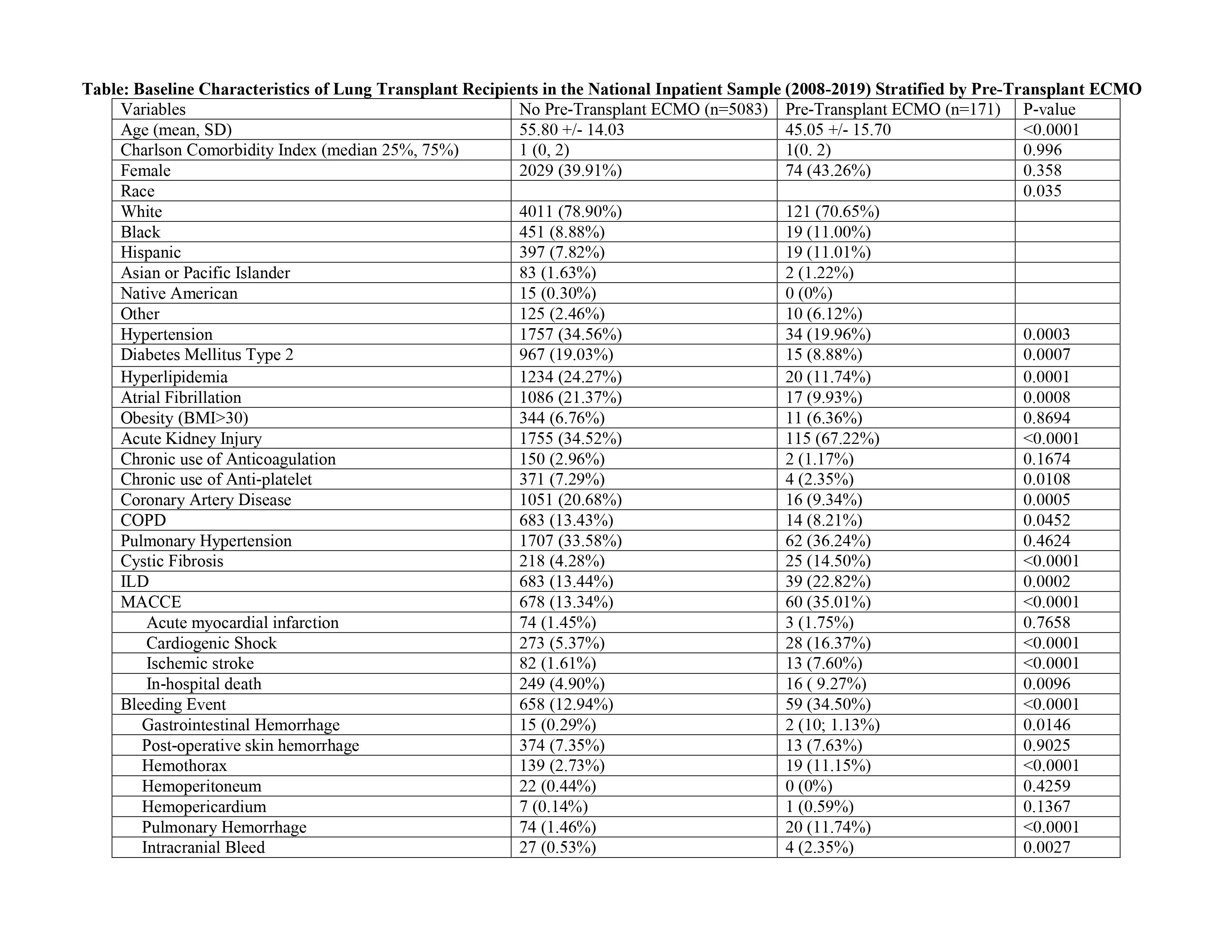Perioperative Cardiovascular Outcomes of Pre-Transplant ECMO in Recipients of Lung Transplant
1Pulmonary and Critical Care, University of Pennsylvania, Philadelphia, PA, 2Nassau University Medical Center, East Meadow, NY, 3Cardiovascular Surgery, University of Pennsylvania, Philadelphia, PA
Meeting: 2022 American Transplant Congress
Abstract number: 1482
Keywords: Lung transplantation, Outcome
Topic: Clinical Science » Lung » 64 - Lung: All Topics
Session Information
Session Time: 7:00pm-8:00pm
 Presentation Time: 7:00pm-8:00pm
Presentation Time: 7:00pm-8:00pm
Location: Hynes Halls C & D
Session Information
Session Time: 7:00pm-8:00pm
 Presentation Time: 7:00pm-8:00pm
Presentation Time: 7:00pm-8:00pm
Location: Hynes Hall C
*Purpose: Use of extracorporeal membrane oxygenation (ECMO) as a bridge to lung transplant (BTT) has increased over time. While similar one-year and overall survival has been reported compared to non- ECMO BTT recipients, there is limited data on other outcomes in this population including major adverse cardiovascular and cerebrovascular events (MACCE) and bleeding events. We sought to evaluate the incidence of perioperative MACCE and major bleeding events in patients undergoing ECMO BTT.
*Methods: Using the National Inpatient Sample from 2008 to 2019, we identified 5254 lung transplant recipients. We then compared baseline characteristics and in-hospital outcomes between patients who underwent ECMO BTT vs. non-ECMO BTT. Using logistic regression, in-hospital outcomes were adjusted for diagnosis, Charlson Comorbidity Index, cardiovascular risk factors, age, gender, and race. The primary outcomes were perioperative MACCE, defined as in-hospital death, myocardial infarction (MI), cardiogenic shock or ischemic stroke, and major bleeding event requiring blood transfusion or surgical intervention post-transplant including hemothorax, hemoperitoneum, hemopericardium, pulmonary hemorrhage, intracranial bleed, gastrointestinal and post-operative skin hemorrhage.
*Results: Perioperative MACCE occurred in 738(14%) lung transplant surgeries while major bleeding occurred in 717(13.64%) patients in the overall cohort. ECMO BTT patients had a higher incidence of MACCE compared to non-BTT (13% vs. 35%, p <0.0001) as well as major bleeding events (12% vs 34%, p <0.0001). Recipients of pre-transplant ECMO for double lung transplant (n=158), were more likely to have perioperative MACCE and major bleeding events in comparison to patients without pre-transplant ECMO (n=3584) [adjusted odds ratio (aOR) 2.69, P <0.0001; 95% Confidence interval [CI] 1.86-3.80].
*Conclusions: ECMO BTT recipients are at an increased odds of MACCE and major bleeding. Close post-operative monitoring and detailed pre-operative risk assessment is warranted in the ECMO BTT population to allow for risk mitigation, prompt diagnosis and early intervention for MACCE and major bleeding complications.
To cite this abstract in AMA style:
Anjum F, Munshi R, Courtwright AM, Crespo MM, Salgado JC, Christie JD, Ahya VN, Patel N, Hadjiliadis D, Clausen E, Cevasco M, Cantu EE, Bermudez CA, Diamond JM. Perioperative Cardiovascular Outcomes of Pre-Transplant ECMO in Recipients of Lung Transplant [abstract]. Am J Transplant. 2022; 22 (suppl 3). https://atcmeetingabstracts.com/abstract/perioperative-cardiovascular-outcomes-of-pre-transplant-ecmo-in-recipients-of-lung-transplant/. Accessed February 26, 2026.« Back to 2022 American Transplant Congress

